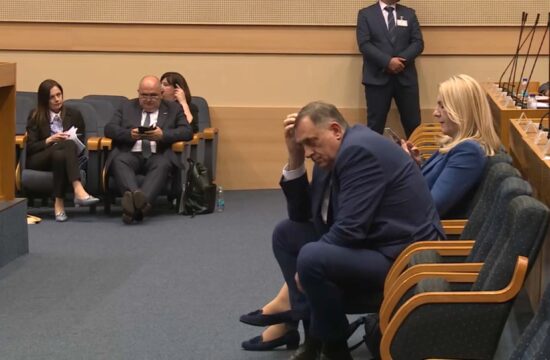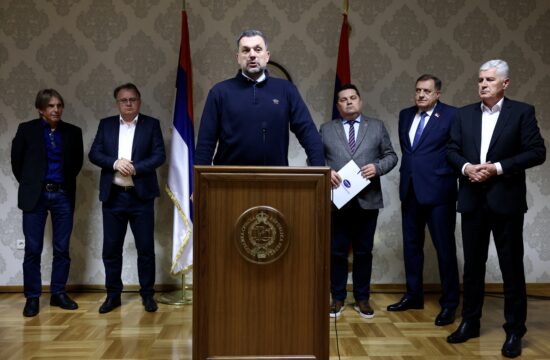
The constitution of Bosnia and Herzegovina is outdated and must be changed as it is a legal obligation stemming from a series of rulings by international courts, several NGOs and associations of intellectuals said in a letter addressed to political parties, the High Representative in the country and the ambassadors in the Peace Implementation Council, offering several principles that should be taken into account during the process.
Changes to the constitution is a complex socio-political project in any country but in Bosnia, it is even more complicated because the international community is part of the process through the Office of the High Representative and representatives of the most influential world powers which do not have the same political views on the country, said the letter, signed by the Council of Congress of Bosniak Intellectuals, the Serb Civic Council – Movement for Equality, the Croat National Council BiH and the Forum of Parliamentarians 1992-1996.
“It is indisputable that the Constitution of BiH must be changed. Amendments to the BiH Constitution are no longer a matter of will, desire or compromise of domestic political parties, but an international legal obligation of Bosnia and Herzegovina arising from the final rulings of international courts rendered in 2007-2020. year, as well as the rulings of the Constitutional Court and the Court of Bosnia and Herzegovina.
The signatories of the letter said that all peoples and minorities must have equal rights and obligations throughout Bosnia and Herzegovina and that this principle is contained in the Dayton Constitution of BiH, which also contains the European Convention on Human Rights and Fundamental Freedoms, which takes precedence over any other laws in BiH.
They stressed that the existing ethnonational concept in BiH, which is especially expressed through the role of the BiH House of Peoples – the upper house of the parliament – and the country’s two semi-autonomous entities, is useless because the mechanism designed to protect the vital national interest is being abused in most cases.
“This mechanism is generally not used for the vital national interests of the people, but for then'vital interests’ of nationalist political parties. Also, it completely suppresses the civil rights guaranteed by the existing Constitution of BiH, which leads to complete ethnic segregation,” they said.
But an even bigger problem for Bosnia’s development is ‘entity voting’, they said.
The constitution foresees the so-called entity voting – a prescribed number of votes have to come from one of Bosnia’s two entities in order for legislation to be adopted. However, since after the wartime ethnic cleansing refugees have not yet returned to their pre-war homes, the entities created during the war remain ethnic-based and this reflects the voting that turns into ethnic voting instead of entity voting.
The signatories listed numerous rulings by international courts, which found that the BiH Constitution is discriminatory against all citizens of all ethnic groups and noted that the European Court of Human Rights has so far handed down “395 verdicts against Bosnia and Herzegovina (BiH), with lawsuits filed by individuals or several of them.”
“Even after more than a decade, the ruling parties have not implemented the verdicts,” they said.
The verdicts represent the international legal basis for changes to the BiH Constitution, they argued.
“The ethnic principle has been imposed through flagrant violations of all human rights, through aggression, ethnic cleansing and genocide. We have no ambition or pretensions to propose concrete solutions or texts of constitutional amendments, but we want to offer principles that should be the starting point for drafting proposed amendments to the Constitution of Bosnia and Herzegovina,” the organisations explained.
All progressive political forces in the country should share these principles so they can present them as a common interest to friendly states and signatories of the Dayton Agreement who are co-responsible for the state and the future of BiH, they said.
“This primarily refers to the US administration, which played a decisive role in establishing peace in our country 25 years ago,” they emphasized.
The signatories listed principles that should serve as a basis for constitutional changes.
Among them was the elimination of systemic discrimination which is widespread in the entire constitutional system. The mentioned judgments of the European Court oblige the state to remove the existing constitutional solutions according to which all citizens who do not declare themselves as members of the constituent peoples – Bosniaks, Serbs and Croats – are denied basic civil and political rights, they said. These rights are also denied to members of constituent peoples if they do not live in the “appropriate” entity. Discrimination is also widespread with regard to other criteria such as gender, religious affiliation, social status, educational level, etc.
Entities in Bosnia and Herzegovina, as administrative forms, were established on the basis of the “factual situation on the ground” caused by international armed conflicts, on the basis of ethnic cleansing, crimes against humanity and international law and genocide, and as such are unsustainable today, the signatories claim. The rulings of the international courts came after the peace agreement was signed and the biggest problem for Bosnia’s functioning in practice, is the entity voting mechanism in the Parliamentary Assembly of Bosnia and Herzegovina, they said.
The failure to implement final court rulings of international and domestic courts clearly shows that in BiH there is a suspension of the rule of law, and in that sense, it is necessary to incorporate all necessary amendments to the Constitution to establish the rule of law and ensure full political independence of BiH judicial institutions, the letter said.
It noted that there are four separate autonomous legal and judicial systems in Bosnia and Herzegovina – at the level of BiH, in both entities and in the Brcko District of BiH. This leads to unharmonised and even conflicting legal solutions and to unharmonised court practice, and thus to the inequality of citizens. Therefore, constitutional solutions must be created to prevent this from happening, they said.
The signatories also called for the Constitution to introduce sanctions for the denial of genocide and crimes against humanity.
The intellectuals said that it was necessary to precisely define in the Constitution the rights that are protected by the vital national interest mechanism/ national veto in the legislative bodies of the state and lower levels of government.
The Constitutional changes must include provisions that will disable the paralysis of state institutions and promote the civic character of the society and the strengthening of the country’s democracy following the examples of other democratic countries in Europe and the world, the intellectuals proposed.
The organisations argued that the decision-making process on constitutional changes must be returned to the institutions of the system – the Parliamentary Assembly of BiH, which should include the NGO sector, the academic community, the media and citizens in the discussions.
“For hundreds of years, Bosnia and Herzegovina has been a multi-religious and multinational country in which the richness of diversity has been an advantage. The unity of diversity is still largely the way of life in it today. The Constitution of Bosnia and Herzegovina must contain, promote and enable this,” the letter concluded.





Kakvo je tvoje mišljenje o ovome?
Budi prvi koji će ostaviti komentar!